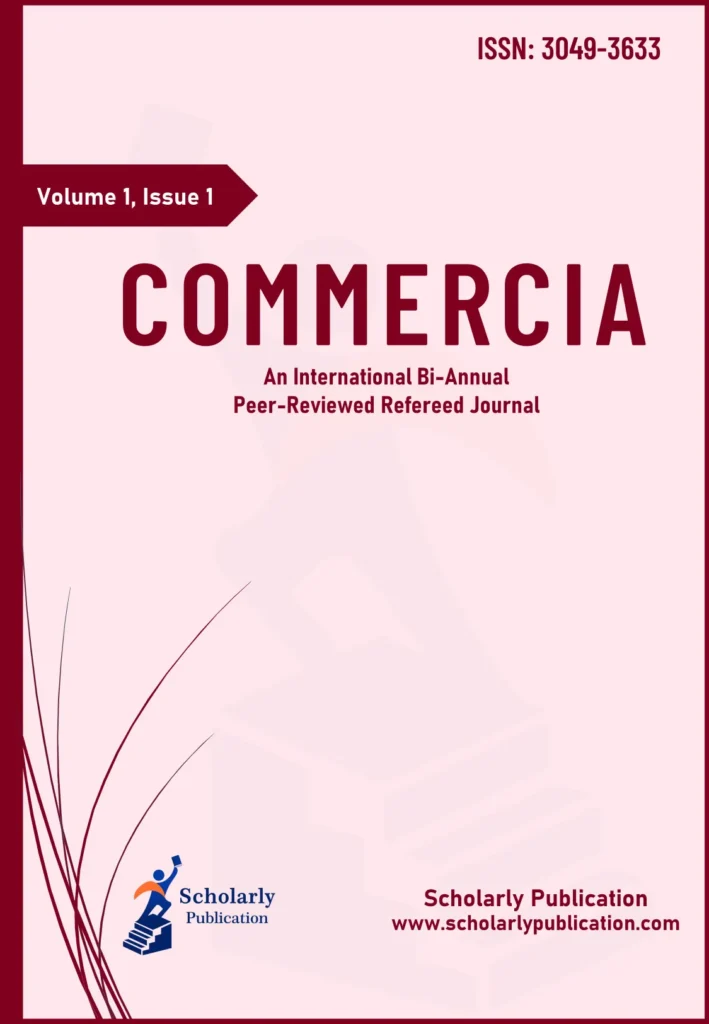Volume 1, Issue 1, Article Number: 251005 (2025)
Home >> Commercia >> Volume 1, Issue 1
Mohammed Atif Hussain1,* | Nishtha Pareek1
1Department of Commerce and Management, Banasthali Vidyapith, Rajasthan (India)
*Corresponding Author: atifhussain1982@yahoo.co.in
Received: 11 January 2025 | Revised: 15 January 2025
Accepted: 16 January 2025 | Published Online: 20 January 2025
DOI: https://doi.org/10.5281/zenodo.15108483
© 2025 The Authors, under a Creative Commons license, Published by Scholarly Publication
Abstract
This research utilises panel data regression analysis to examine a period of ten years relating to the sustainability of Omani and Indian banks, thereby investigating financial metrics including return on assets, return on equity, adequate capital ratio, and loan loss provisions, ESG scores, and CSR initiatives. The document uses Stata software to assess models, such as Fixed Effects and Random Effects Models. The Hausman test was also utilized to select the most appropriate model. Findings reveal that financial performance and sustainability practices vary significantly among banks in both countries. ESG practices have minimal association with financial success; however, LLP is beneficially correlated with ESG performance. The study provides on the complex interrelationships among financial metrics, ESG, and CSR in banking, offering insights into sustainability, profitability, and risk management. For long-term bank stability and performance, it underscores the importance of solid management as well as sustainability integration, with significant implications for consumers and investors.
Keywords
Bank Sustainability, Return on Assets (ROA), Return on Equity (ROE), ESG scores, Corporate Social Responsibility (CSR)
References
- Al-Jalahma, A., Al-Fadhel, H., Al-Muhanadi, M., & Al-Zaimoor, N. (2020). Environmental, Social, and Governance (ESG) disclosure and firm performance: Evidence from GCC Banking sector. 2020 International Conference on Decision Aid Sciences and Application (DASA), 54–58.
[View Article] [Google Scholar]
- Arun, T., Girardone, C., & Piserà, S. (2022). ESG issues in emerging markets and the role of banks. In Handbook of banking and finance in emerging markets. Edward Elgar Publishing, 321–344.
[View Chapter] [Google Scholar]
- Chaturvedi, K., Akhtar, S., Azhar, N., & Shamshad, M. (2021). Impact of corporate social responsibility on financial performance of selected banks in india: based on camel model. Studies in Economics and Business Relations, 2, 17-31.
[View Article] [Google Scholar]
- Dalal, K. K., & Thaker, N. (2019). ESG and corporate financial performance: A panel study of Indian companies. IUP Journal of Corporate Governance, 18, 44-59.
- Galdeano, D. M., Fati, M., Ahmed, U., Rehan, R., & Ahmed, A. (2019). Financial performance and corporate social responsibility in the banking sector of Bahrain: Can engagement moderate?. Management Science Letters, 9, 1529–1542.
[View Article] [Google Scholar]
- Iqbal, U. P., Mathew Jose, S., & Daniel, T. M. (2025). Levels of mandatory CSR compliance and the payoff: evidence from India. Social Responsibility Journal, 21, 378-390.
[View Article] [Google Scholar]
- Jawad, A., & Abdulla, Y. (2022). ESG scores in MENA banks. 2022 International Conference on Sustainable Islamic Business and Finance (SIBF), 69–73.
[View Article] [Google Scholar]
- Jayaraman, G., Azad, I., & Ahmed, H. S. (2021). The impact of financial variables on firm profitability: an empirical study of commercial banks in Oman. Journal of Asian Finance, Economics and Business, 8, 885-896.
[View Article] [Google Scholar]
- Khan, F., & Al Maktoumi, I. (2021). Performance Evaluation of Commercial Banks in Oman Using Ratio Analyses. International Journal of Research in Entrepreneurship & Business Studies, 2, 10–21.
[View Article] [Google Scholar]
- Khémiri, W., Chafai, A., Attia, E. F., Tobar, R., & Farid Fouad, H. (2024). Trade-off between financial inclusion and Islamic bank stability in five GCC countries: the moderating effect of CSR. Cogent Business and Management, 11, 2300524.
[View Article] [Google Scholar]
- Kumar, K., & Prakash, A. (2019). Developing a framework for assessing sustainable banking performance of the Indian banking sector. Social Responsibility Journal, 15, 689–709.
[View Article] [Google Scholar]
- Li, L., & Galvani, V. (2018). Market states, sentiment, and momentum in the corporate bond market. Journal of Banking & Finance, 89, 249–265.
[View Article] [Google Scholar]
- Mariappan, R. (2024). a Comparative Analysis of Profit Performance of Banking Sector in India: A Three Stage Approach. Journal of South Asian Research, 2, 103–121.
- Mhadhbi, K., Terzi, C., & Bouchrika, A. (2020). Banking sector development and economic growth in developing countries: a bootstrap panel Granger causality analysis. Empirical Economics, 58, 2817–2836.
[View Article] [Google Scholar]
- Miah, M. D., Rahman, S. M., & Mamoon, M. (2021). Green banking: the case of commercial banking sector in Oman. Environment, Development and Sustainability, 23, 2681–2697.
[View Article] [Google Scholar]
- Mitra, N., & Schmidpeter, R. (2017). The why, what and how of the CSR mandate: The India story. In: Mitra, N., Schmidpeter, R. (eds) Corporate Social Responsibility in India: Cases and Developments after the Legal Mandate, Springer, 1–8.
[View Chapter] [Google Scholar]
- Roy, A. (2017, February 8). RBI working on green finance framework. Business Standard.
[View Article] [Google Scholar]
- Sain, A., & Kashiramka, S. (2024). Do corporate governance mechanisms and ESG disclosures improve bank performance and stability in an emerging economy?. Journal of Advances in Management Research, 21, 530–555.
[View Article] [Google Scholar]
- Sharma, E., & Sathish, M. (2022). “CSR leads to economic growth or not”: an evidence-based study to link corporate social responsibility (CSR) activities of the Indian banking sector with economic growth of India. Asian Journal of Business Ethics, 11, 67-103.
[View Article] [Google Scholar]
- Sharma, M., & Choubey, A. (2022). Green banking initiatives: a qualitative study on Indian banking sector. Environment, Development and Sustainability, 24, 293–319.
[View Article] [Google Scholar]
- Sharma, S., Gupta, C., Khanna Malhotra, R., & Upreti, H. (2024). Sustainable Banking Practices: Impact, challenges and opportunities. E3S Web of Conferences, 556,
[View Article] [Google Scholar]
- Umair, S., Waqas, U., Mrugalska, B., & Al Shamsi, I. R. (2024). Correction: Umair et al. Environmental Corporate Social Responsibility, Green Talent Management, and Organization’s Sustainable Performance in the Banking Sector of Oman: The Role of Innovative Work Behavior and Green Performance. Sustainability 2023, 15, 14303. Sustainability, 16, 947.
Cite This Article
M. A. Hussain and N. Pareek, “Analysing Bank Sustainability: A Comparative Study of Banks in Oman and India,” Commercia 1(1) (2025) 251005. https://doi.org/10.5281/zenodo.15108483
Rights & Permission
This is an open access article published under the Creative Commons Attribution (CC BY) International License, which allows unrestricted use, distribution, and reproduction in any medium, provided the original work is properly cited. No permission is needed to reuse this content under the terms of the license.
For uses not covered above, please contact the Scholarly Publication Rights Department.

